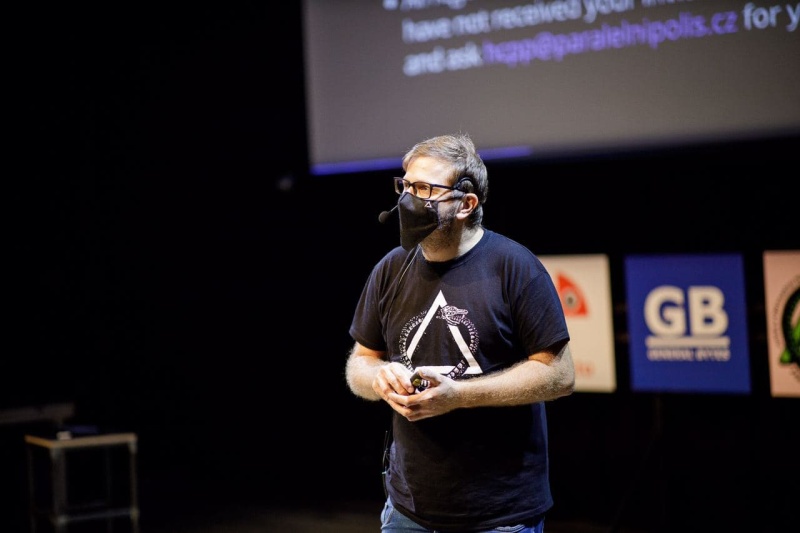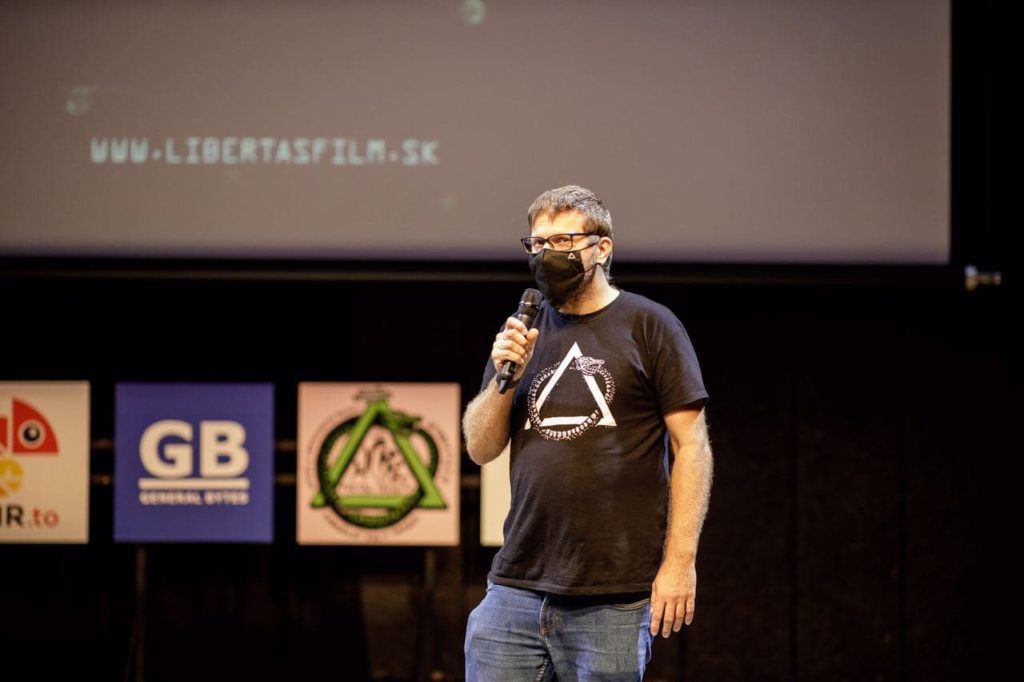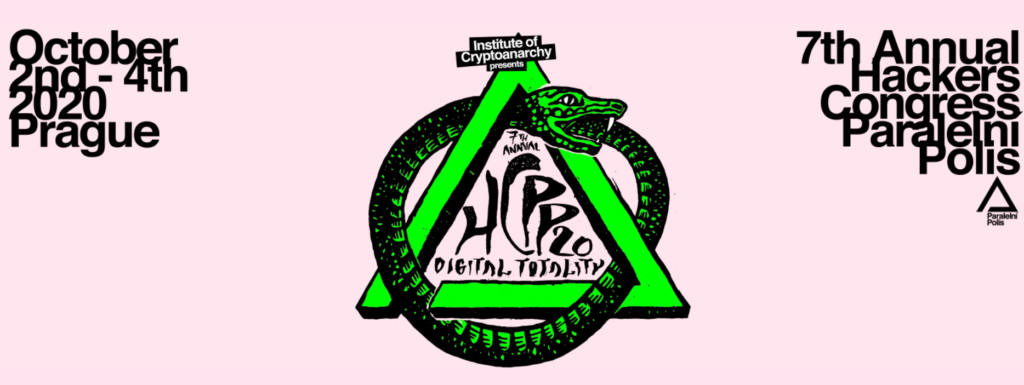Crypto-anarchism and Opting Out of the System – an Interview with Pavol Lupták

At the annual HCPP2020 conference, we finally had the chance to sit down with Pavol Lupták, the founder of Paralelní Polis in the Czech Republic. And we definitely had a lot to cover: from today’s political issues and crypto-anarchism, to even his own life – specifically the reason behind his recently acquired residence permit from Panama and Paraguay.
Or, in short, here’s the man behind the hacker conference.
BitcoinBázis: Let’s start at the beginning – both for you and Paralelní Polis. How did you get started and where did the idea come from?
PL: If we really want to go back to the beginning, it actually started with the Soviet Union army occupation of Czechoslovakia and the Prague Spring in 1968 – something very similar to what happened in Hungary in 1956. After that, in the 70s, we had this period called ‘normalization’ which meant that secret Czechoslovakian agents infiltrated everything (the Czechoslovakian version of KGB or Stazi). People couldn’t trust each other, and it was impossible to change the political system: it was impossible to go on strike, to demonstrate, to make a revolution. So, at the end of the 70s, a dissident movement formed called Charter 77. This was a group of freedom activists who, for example, asked the Czechoslovakian government to stop censorship. Among the crucial leaders was Václav Havel who then became the first democratically elected president in 1989.
And in this group, there was also a guy (a close friend of Václav Havel), Václav Benda. He was a mathematician with a lot of abstract thoughts. He realized that okay, we can’t escape Czechoslovakia because the borders are closed, we have to live in this totalitarian system – so what should we do? Then he wrote the Paralelní Polis manifesto
BitcoinBázis: Is it basically a whitepaper?
PL: It is a very general whitepaper. In this manifesto, he declared a need for a parallel society. We have to indoctrinate our children in communist schools, we have to use the communist stores, okay. But let’s build a parallel alternative. For example, the members of Charter 77 educated their own children after school. There was basically an underground homeschooling movement.
BitcoinBázis: How many people were in this movement?
PL: Maybe a hundred people, mainly in Prague.
BitcoinBázis: Did they have problems with the ruling system? Were they prosecuted for this?
PL: Of course, a lot of problems. They were spied on; they were basically hunted. But the interesting thing is that this Paralelní Polis manifesto is not famous. One of the reasons for that is that the manifesto itself is probably too anarchist. They declared a need for a parallel market that would be completely out of control of the government; also a parallel education and culture and even a legal system.
We basically call this manifesto Version 1 – and we are Version 2.
BitcoinBázis: Do you also have a manifesto?
PL: No. So this happened at the end of the 70s but it was something that most people didn’t understand and it was never really implemented. People completely forgot about it – until the beginning of the 90s when there was a cypherpunk movement in San Francisco, California with people like Timothy C. May who created The Crypto Anarchist Manifesto and predicted bitcoin and decentralized society. These people were super enthusiastic because it was also when the first version of PGP was created: the first practical implementation of asymmetrical cryptography. They realized that we can have really powerful crypto technologies that can empower our privacy and freedom, and we can have encrypted communication as well, with no possible interception from the government.
Paralelní Polis is a permanent project of Czech contemporary artistic group called Ztohoven, which means two things. One meaning is basically “out of it” – but it also means one hundred pieces of sh*t. This group is quite old, created almost 20 years ago, and it is mostly made up of artists. When about 9 years ago I joined with my friend, we brought this crypto-anarchist thinking into the group. Then about 8 years ago we realized that thanks to existing crypto technologies, especially cryptocurrencies and decentralized technologies, we can achieve those original goals, that parallel society. And thanks to the Internet, we can also do it in a global way.
We don’t believe in political change, at least in a democratic way, because in democracy what matters is the majority of people and we were and always will be the minority. So we don’t believe in a political change – but what we believe is that, despite being a minority, we can target similar-minded people globally and create a global community with millions of people. We basically consider ourselves a competitor to the government and the state.
BitcoinBázis: Do you completely reject the idea that we can one day mainstreamize this idea?
PL: The first thing we had to realize that we are and will always be a minority – otherwise, we could have created a political party. You can join if you share our goals and ideas but we will remain the minority. It was also crucial to realize this, because it means that we have to do everything to protect our small community.
BitcoinBázis: Speaking of protecting your small communities, do you think it’s good to radicalize the cypherpunk community?
PL: This is quite interesting because a lot of people call us radicals. Most of us are voluntaryists: we believe that all human relationships should be mutually voluntary. We are also trying to be consistent voluntaryists: not only do we respect mutually voluntary relationships, but we also reject any one-way or forced relationships. And because we are consistent voluntaryists, we have to be anarchists, because the relationship between the government and you is definitely not mutually voluntary. You have never decided that you wanted to be in this one-way relationship.
We also think that when you have any involuntary relationships and you cannot leave, you can do everything to minimize the negative consequences. For example, you can lie. From a moral point of view, I think it’s completely moral not to pay taxes just because it’s a way to minimize the negative consequences from a one-way relationship with the government. A lot of people also consider us anarchists just because we think that everyone should have the right to decide voluntarily in all situations.
BitcoinBázis: But you still have to interact with society?
PL: Yes, and we still do. For example, here at the conference we pay VAT for all sold tickets. We still interact with the government.
There’s a special law called Electronic Evidence of Transaction. This means that if you buy anything, for example, a beer in a Czech supermarket, the information about this transaction is immediately sent to the Czech tax office. Which means that the Czech government has full control over all transactions at any given time. In Paralelní Polis we not only ignore this law but we publicly boycott it – and we’re basically the only organization in the Czech Republic to do so.

BitcoinBázis: Did you suffer any consequences because of this?
PL: Of course, we’ve had many tax inspections. Now we’re in a legal fight with the Czech National Bank because a few years ago there was a new law that the national bank has monopoly over the word ‘coin’. Every year we issue a coin dedicated to a digital freedom fighter, for example Snowden, and we got fined 50 000 Czech korunas for calling them ‘coins’. Also, when you come into our building, instead of a huge banner inviting people to the conference, we have the words “Polibte nám prdel” – which means “kiss our ass” in Czech. The city district didn’t allow us to put up the official banner so we put these words up instead, and it became a very popular meme in the Czech Republic. Over one million people saw it. So we definitely have to deal with legal issues.
BitcoinBázis: Moving onto a more personal topic – how did you personally got into this world?
PL: I’m a computer hacker. I have two ethical IT security companies: I’ve been doing IT security for the past 20 years. About 10 years ago I was invited to a conference in Slovakia, and there I met two founding members of Ztohoven. After the conference I was telling them what bitcoin was and they were really enthusiastic about it. Then I showed them how SMS spoofing worked. They gave me their numbers and I sent a message from one guy to another.
They were so impressed that we decided to use this hacking technique for another project called Moral Reform. We got the mobile numbers of a lot of Czech politicians, including the president, members of parliament – their private mobile numbers. We wrote 800 different SMS text messages and we sent these messages between these politicians. And we did it during the livestream of a parliament session. It was thanks to this project that we started cooperating.
BitcoinBázis: What changes did you see during these eight years? How big is the Czech community now?
PL: The Czech community is really big. During these seven years, it changed significantly. Now we don’t need to tell people how to install wallets because everyone knows it – it’s the new normal.
BitcoinBázis: Any plans for the future?
PL: Two or three years ago, we’ve created Paralelní Polis in Bratislava. It was a pretty successful project but because of the pandemic we decided to cancel that project. A small version of Paralelní Polis is still active in Vienna. There are also a couple people in Barcelona. Now it’s really hard to survive because we’re a non-profit, non-commercial and non-government institution. We don’t take any grants or money or subsidies from them – so it’s quite difficult to survive and we have to be innovative.
BitcoinBázis: And is it sustainable?
PL: It was sustainable until the pandemic then we switched to online. Because a lot of people support us, we were able to crowdfund more than half a million Czech korunas which lasts for about two months for us – crowdfunding basically saved us. This is a typical problem of non-profit organizations.
BitcoinBázis: Are you planning to commercialize it someway?
PL: Yes, we are offering some of the services of Paralalní Polis. But we are still trying to find ways to earn money which are compliant with our values. Fortunately, we have a good international reputation and we are able to find really good sponsors.
BitcoinBázis: Another more personal question: yesterday you mentioned that you are a Panama and Paraguay resident. Was your main goal with that to avoid European surveillance states?
PL: All citizens should be customers of the government and the government should provide us services for our taxes. I don’t feel like a customer anymore. About five years ago, I started traveling a lot, not even coming back, just traveling from one country to another. And I realized that if you travel a lot, it doesn’t make sense to have any duties in any country, so I started to look for alternatives.
Two years ago, I became a Panama resident and recently, I’ve become a resident of Paraguay. I’m basically following this idea: you’re a citizen of one country, you’re a permanent resident of another country, you have a company in the third country, you have a bank account in the fourth county, you have customers from the fifth country, and finally you live in the sixth country. And each country, you choose them in a completely opportunistic way.
I also wrote a book about this (it’s coming out at the end of this year) called Opt out of the system. It’s basically a bio and practical information on how to achieve both personal and economic freedom by being global and flexible.

BitcoinBázis: Do you think it’s hard to get no coiners into the ecosystem?
PL: The usability of cryptocurrency has improved a lot recently. I care about freedom and privacy a lot. Most people think that if you don’t like the government, you should just vote. But the weight of your vote is basically nothing. So the best thing you can do with your life right now is to opt out and use all technologies and legislative loopholes.
BitcoinBázis: What’s going to happen if more people opt out?
PL: Most people won’t do it, because they won’t leave their comfort zones. For some people, it’s an issue if they can’t have a Slovak or a Czech national ID – I don’t care about that.
BitcoinBázis: Do you think it’s a generational issue? Younger people, especially people born after 2000, might be more open to this idea?
PL: I think this is pretty much the same in all generations. I don’t think we’ll have more anarchists in the next generation. It can’t be forced. Everybody should decide for themselves if they want to use these tools to improve their privacy. We don’t care about the masses or populist politicians. We care about individuals and we want to build a community with these specific, similar-minded people.
BitcoinBázis: Is it completely pointless to build propaganda then in a society that is becoming more and more authoritarian?
PL: We are trying to provide a safe haven for all people who are willing and able to escape the system on multiple levels. But everyone can decide it for themselves. Most people feel fine in the system and we won’t be able to change their opinions. The only thing we want is to be free and independent from the decisions of these people. I don’t care if you’re going to vote for your favorite politician. I just want to minimize every negative impact of your politician on my life.
BitcoinBázis: Final question: where do you see bitcoin in five or ten years?
PL: I see bitcoin as a store of value to protect you against hyperinflation – because I’m afraid that it is only a question of time. I trust bitcoin, it’s the digital gold. But it also has to be improved. I really don’t like KYC and AML that are disrupting the original idea.